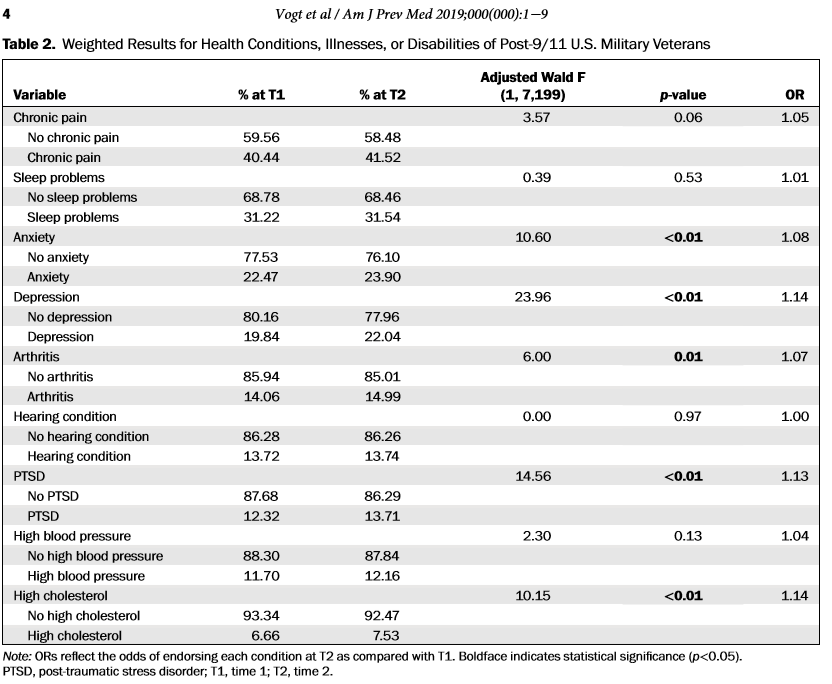Most Report Satisfaction with Work Life, Social Well-Being
BOSTON — Health issues plague veterans, even when they first leave military service and are viewed as a bigger problem than finding work or establishing civilian social relationships.
That’s according to a new VA study revealing that, while veterans said in a survey that they were mostly satisfied with their work and social well-being, more than half reported grappling with chronic physical health conditions, and a third reported ongoing mental health conditions.
Results were published in the American Journal of Preventive Medicine.1
“What remains to be seen is whether those veterans with health conditions–which were more commonly experienced by deployed veterans—continue to maintain high levels of well-being in other life domains over time,” explained lead author Dawne Vogt, PhD, of the VA Boston Healthcare System and Boston University. “Given that it is well-established that health problems can erode functioning in other life domains, it may be that these individuals experience declines in their broader well-being over time.”
The information has widespread ramifications; the study pointed out that more than 200,000 U.S. servicemembers transition out of the military each year. The early transition period is known to be a critical time to address challenges veterans may face in readjusting to civilian life.
A desire to determine which challenges most affect newly separated veterans led to the VA National Center for PTSD-led survey of nearly 10,000 veterans from a population-based roster of all separating servicemembers.
The 9,566 veterans, all of whom left the military in the fall of 2016, were surveyed about three months after their separation and then six months after that. Tested were several hypotheses regarding differences in veterans’ well-being over time, across life domains, and based on sex, military rank and deployment history. Analyses were completed in 2019.
“Health concerns were most salient for newly separated veterans, with many veterans reporting that they had chronic physical (53%) or mental (33%) health conditions and were less satisfied with their health than either their work or social relationships,” researchers wrote. “By contrast, most veterans reported relatively high vocational and social well-being and only work functioning demonstrated a notable decline in the first year following separation.”
Some differences were noted, according to the authors, “Enlisted personnel reported consistently poorer health, vocational, and social outcomes compared with their officer counterparts, whereas war zone–deployed veterans reported more health concerns and women endorsed more mental health concerns compared with their nondeployed and male peers.”
The study concluded that most newly separated veterans experience high vocational and social well-being as they reintegrate into civilian life. Researchers cautioned, however, that the “findings point to the need for additional attention to the health of separating servicemembers and bolstered support for enlisted personnel to prevent the development of chronic readjustment.
Background information in the study pointed out that more than 40,000 organizations provide programs, services and supports to assist veterans with the military-to-civilian transition. Furthermore, it said that information on veteran benefits, education options, federal assistance and employment help are offered through the federally sponsored transition assistance program.
The open question, though, is whether the programs address the most pressing health, vocational and social needs of recently transitioned veterans. That’s why this study was conducted to provide a comprehensive assessment of the health and well-being of newly separated post-9/11 veterans.
The survey tested several presumptions, including:
-
Consistent with the assertion that veterans may experience a “honeymoon period” after they separate from service, with readjustment difficulties becoming more salient over time, Hypothesis 1 proposed that a greater proportion of veterans would report good health and well-being at the time of separation than six months later.
-
Consistent with the expectation that health problems, especially mental health problems, would be of greatest concern for newly separated veterans,Hypothesis 2 proposed that a greater proportion of veterans would report higher well-being in vocational and social domains than in the health domain.
-
Building on the broader literature on subgroup differences in post-military well-being, Hypothesis 3 proposed that men, officers and nondeployed veterans would report better health and well-being, compared with women, enlisted personnel and war zone-deployed veterans.
By far, the biggest concerns were found to relate to health. At both three and nine months after leaving the military, 53% of participants said they had chronic physical health conditions, while about 33% reported chronic mental health conditions at both timepoints, according to the report.
Chronic pain, sleep problems, anxiety and depression were the most commonly reported health conditions. While just more than half of participants said they had reduced satisfaction with their health between when they first left the military and a few months later, those levels of satisfaction didn’t change much between three and nine months after separation.
The good news was that, despite physical and mental health concerns, most of the veterans reported high vocational and social well-being. The majority of participants said they were satisfied with their work and social relationships and that they were functioning well in these areas.
That, according to Vogt, “highlights the resilience of the veteran population and should provide some reassurance to those concerned about the well-being of newly separated veterans.”
In fact, more than 75% of respondents said they were in an intimate relationship in the months after they left the military, and nearly that percentage said that they had regular contact with their friends and extended family and that they were involved in their broader communities.
Three months after military separation, more than half of participants had found work, according to the survey. Yet, while most participants reported high work satisfaction, the study group showed an overall decline in work functioning over the first year after military separation, employment rates increased.
Continue Reading this Article: Decline in Work Functioning


